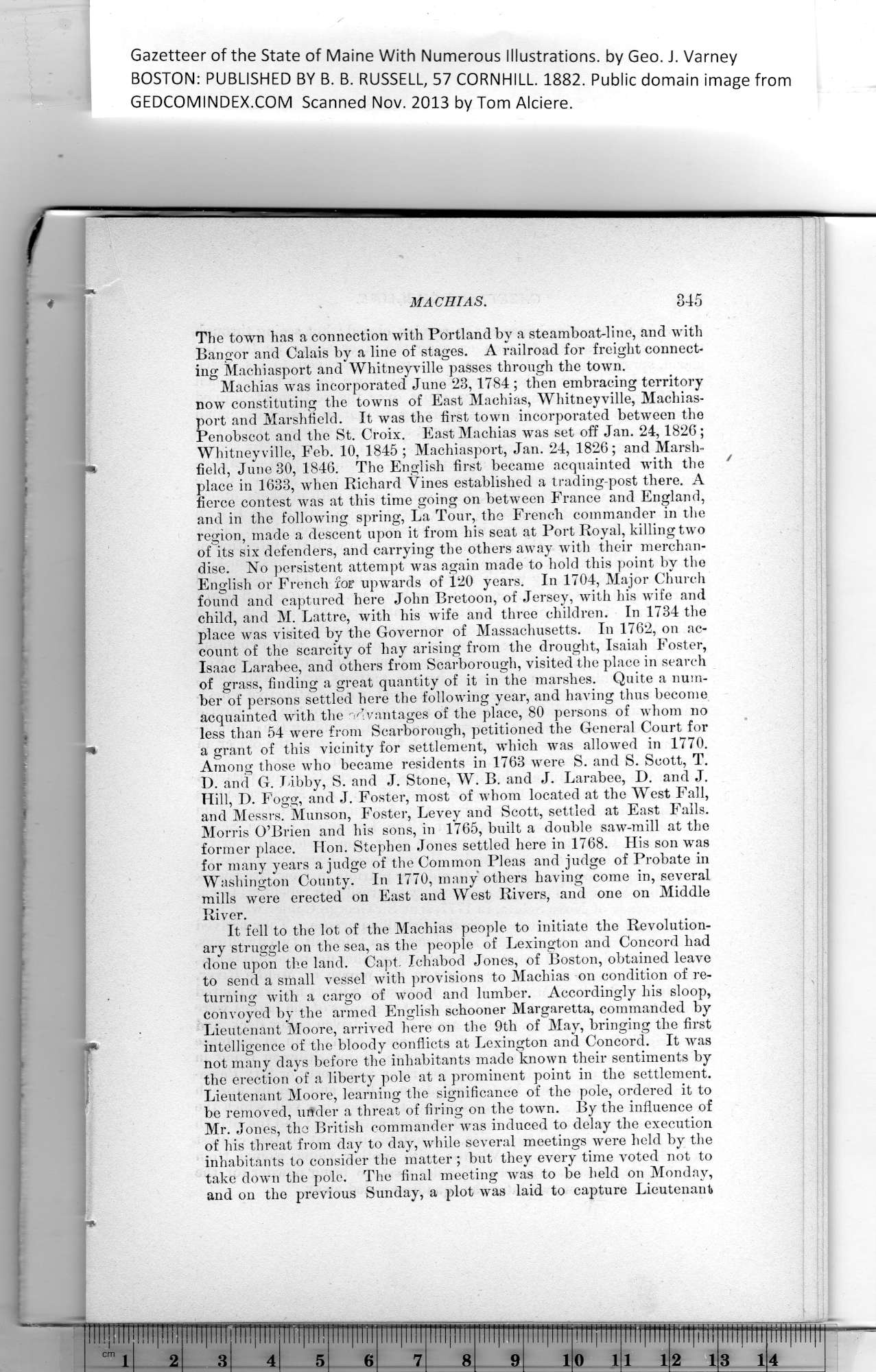|
Gazetteer of the State of Maine With Numerous Illustrations, by Geo. J. Varney
BOSTON. PUBLISHED BY B. B. RUSSELL, 57 CORNHILL. 1882. Public domain image from
MACHIAS. 845
The town has a connection with Portland by a steamboat-line, and with
Bangor and Calais by a line of stages. A railroad for freight connect-
ing Machiasport and Whitneyville passes through the town.
Machias was incorporated June 23,1784 ; then embracing territory
now constituting the towns of East Machias, Whitneyville, Machias-
port and Marshfield. It was tbe first town incorporated between the
Penobscot and the St. Croix. East Machias was set off Jan. 24,1826;
Whitneyville, Feb. 10, 1845 ; Machiasport, Jan. 24, 1826; and Marsh-
field, June 30, 1846. The English first became acquainted with the 7
place in 1633, when Richard Vines established a trading-post there. A
fierce contest was at this time going on between France and England,
and in the following spring, La Tour, the French commander in the
region, made a descent upon it from his seat at Port Royal, killing two
of its six defenders, and carrying the others away with their merchan-
dise. No persistent attempt was again made to hold this point by tbe
English or French £or upwards of 120 years. In 1704, Major Church
found and captured here John Bretoon, of Jersey, with his wife and
child, and M. Lattre, with his wife and three children. In 1734 the
place was visited by the Governor of Massachusetts. In 1762, on ac-
count of the scarcity of hay arising from the drought, Isaiah Foster,
Isaac Larabee, and others from Scarborough, visited the place in search
of grass, finding a great quantity of it in the marshes. Quite a num-
ber of persons settled here the following year, and having thus become
acquainted with the ndvantages of the place, 80 persons of whom no
less than 54 were from Scarborough, petitioned the General Court for
a grant of this vicinity for settlement, wTiich was allowed in 1770.
Among those who became residents in 1763 were S. and S. Scott, T.
D. and G. Libby, S. and J. Stone, W. B. and J. Larabee, D. and J.
Hill, D. Fogg, and J. Foster, most of whom located at the West Fall,
and Messrs. Munson, Foster, Levey and Scott, settled at East Falls.
Morris O’Brien and his sons, in 1765, built a double saw-mill at the
former place. Hon. Stephen Jones settled here in 1768. His son was
for many years a judge of the Common Pleas and judge of Probate in
Washington County. In 1770, many others having come in, several
mills were erected on East and West Rivers, and one on Middle
River.
It fell to the lot of the Machias people to initiate the Revolution-
ary struggle on the sea, as the people of Lexington and Concord had
done upon the land. Capt. Ichabod Jones, of Boston, obtained leave
to send a small vessel with provisions to Machias on condition of re-
turning with a cargo of wood and lumber. Accordingly his sloop,
convoyed by the armed English schooner Margaretta, commanded by
Lieutenant Moore, arrived here on the 9th of May, bringing the first
intelligence of the bloody conflicts at Lexington and Concord. It was
not many days before the inhabitants made known their sentiments by
the erection of a liberty pole at a prominent point in the settlement.
Lieutenant Moore, learning the significance of the pole, ordered it to
be removed, under a threat of firing on tbe town. By the influence of
Mr. Jones, the British commander was induced to delay the execution
of his threat from day to day, while several meetings were held by the
inhabitants to consider the matter ; but they every time voted not to
take down the pole. The final meeting was to be held on Monday,
and on tbe previous Sunday, a plot was laid to capture Lieutenant
PREVIOUS PAGE ... NEXT PAGE
This page was written in HTML using a program written in Python 3.2
|
